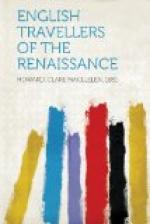The dangers of travel were of a nature to alarm mothers. As well as Catholics, there were shipwrecks, pirates, and highway robbers. Moors and Turks lay waiting “in a little port under the hill,” to take passenger vessels that went between Rome and Naples. “If we had come by daye as we did by night, we had bin all taken slaves."[91] In dark strait ways up the sides of mountains, or on some great heath in Prussia, one was likely to meet a horseman “well furnyshed with daggs (pistols), who myght well be called a Swarte Ritter—his face was as black as a devill in a playe."[92] Inns were death-traps. A man dared not make any display of money for fear of being murdered in the night.[93] It was wiser to disguise himself as a humble country boy and gall his feet by carrying all his gold in his boots. Even if by these means he escaped common desperadoes, he might easily offend the deadly University students, as did the eldest son of Sir Julius Caesar, slain in a brawl in Padua,[94] or like the Admirable Crichton, stabbed by his noble pupil in a dark street, bleed away his life in lonely lodgings.[95] Still more dangerous were less romantic ills, resulting from strange diet and the uncleanliness of inns. It was a rare treat to have a bed to oneself. More probably the traveller was obliged to share it with a stranger of disagreeable appearance, if not of disposition.[96] At German ordinaries “every travyler must syt at the ordinary table both master and servant,” so that often they were driven to sit with such “slaves” that in the rush to get the best pieces from the common dish in the middle of the table, “a man wold abhor to se such fylthye hands in his dish."[97] Many an eager tourist lay down with small-pox before he had seen anything of the world worth mentioning, or if he gained home, brought a broken constitution with him. The third Lord North was ill for life because of the immoderate quantities of hot treacle he consumed in Italy, to avoid the plague.[98]




